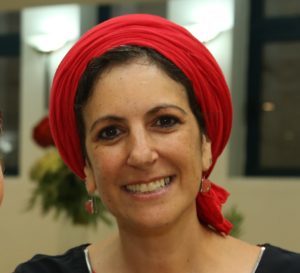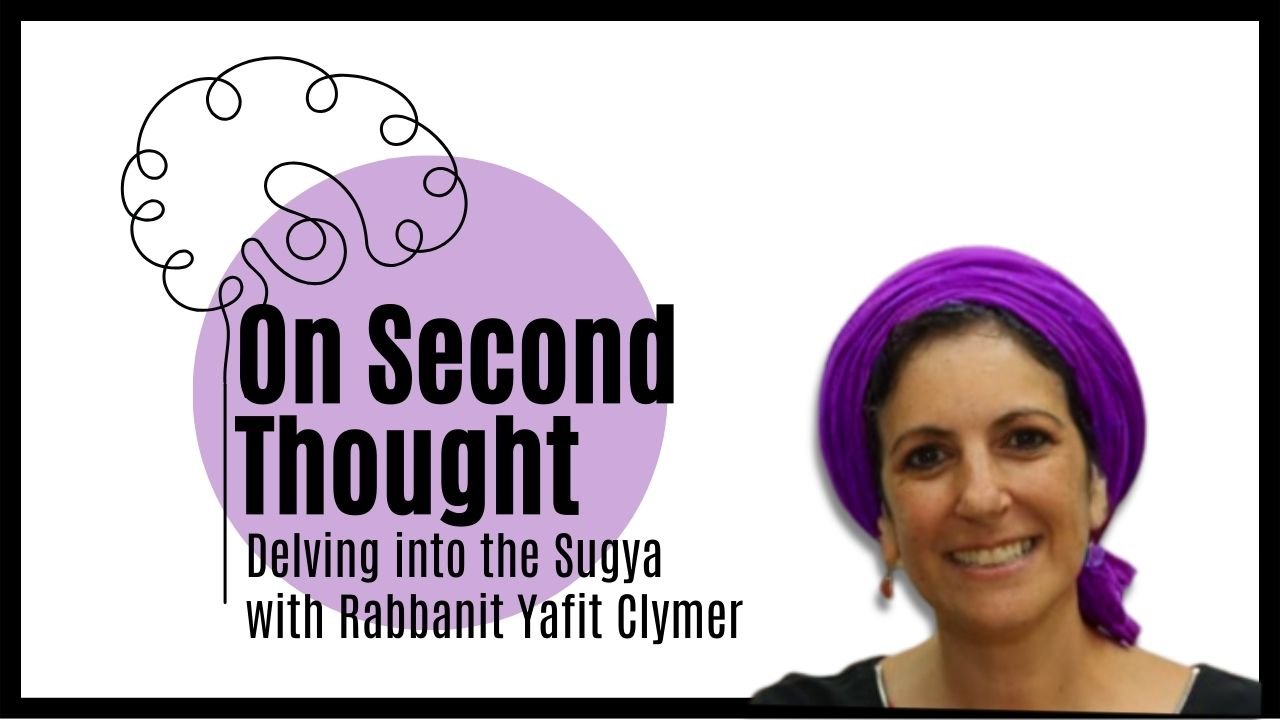On Second Thought: Delving Into the Sugya with Rabbanit Yafit Clymer
Sources:
זבחים נ”ד ב
דָּרֵשׁ רָבָא, מַאי דִּכְתִיב: ״וַיֵּלֶךְ דָּוִד וּשְׁמוּאֵל וַיֵּשְׁבוּ בְּנוֹיוֹת בָּרָמָה״? וְכִי מָה עִנְיַן נוֹיוֹת אֵצֶל רָמָה? אֶלָּא שֶׁהָיוּ יוֹשְׁבִין בָּרָמָה וְעוֹסְקִין בְּנוֹיוֹ שֶׁל עוֹלָם. אָמְרִי, כְּתִיב: לָא הֲווֹ יָדְעִי דּוּכְתֵּיהּ הֵיכָא;
- Apropos the altar and the Temple, the Gemara relates that Rava taught: What is the meaning of that which is written concerning David: “And he and Samuel went and dwelt in Naioth. in Ramah” (I Samuel 19:18–19)? But what does Naioth have to do with Ramah? They are in two distinct places. Rather, this means that they were sitting in Ramah and were involved in discussing the beauty [benoyo] of the world, i.e., the Temple.
They did not know where the highest place in Eretz Yisrael was.
רש”י על זבחים נ״ד ב שהן יושבים ברמה – בעירו של שמואל:
They Sat in Ramah – the city of Samuel
רש”י על זבחים נ״ד ב נויו של עולם – למצוא מקום לבית הבחירה מן התורה:
Finding the place of the Mikdash in the Torah:
שמואל א י״ט:י״ח I Samuel 19:18
David made good his escape, and he came to Samuel at Ramah and told him all that Saul had done to him. He and Samuel went and stayed at Naioth.
שמואל א י״ט:כ״ב I Samuel 19:22
So he himself went to Ramah. When he came to the great cistern at Secu, he asked, “Where are Samuel and David?” and was told that they were at Naioth in Ramah.
מילון יסטרוב, נוֹי א׳
נוֹי, נוֹא m. (נָוָה, נָאָה) 1) beauty, ornament.
עוסקין בנוֹיוֹ של וכ׳ engaged in the embellishment of the world (consulting about building the Temple).
זבחים נד
וְעַל דָּבָר זֶה נִתְקַנֵּא דּוֹאֵג הָאֲדוֹמִי בְּדָוִד, כְּדִכְתִיב: ״כִּי קִנְאַת בֵּיתְךָ אֲכָלָתְנִי״, וּכְתִיב: ״זְכוֹר ה׳ לְדָוִד אֵת כׇּל עֻנּוֹתוֹ אֲשֶׁר נִשְׁבַּע לַה׳ וְגוֹ׳, אִם אָבֹא בְּאֹהֶל בֵּיתִי וְגוֹ׳, אִם אֶתֵּן שְׁנַת לְעֵינָי לְעַפְעַפַּי תְּנוּמָה עַד אֶמְצָא מָקוֹם לַה׳ וְגוֹ׳״.
And with regard to this matter, that David and Samuel discovered the location of the Temple, Doeg the Edomite was jealous of David, as it is written: “Because jealousy for Your House has eaten me up” (Psalms 69:10), and it is written: “Lord, remember for David all his affliction; how he swore to the Lord, and vowed unto the Mighty One : I will not come into the tent of my house, nor go up into the bed that is spread for me; if I will give sleep to my eyes, or slumber to my eyelids; until I find a place for the Lord, a dwelling place for the Mighty One of Jacob” (Psalms 132:1–5).
רש”י – את כל ענותו – אשר עינה את עצמו לעסוק ולדעת ונשבע ונדר אם אבא באהל וגו’:
He tortured himself to study and learn, and swore and vowed, I will not come into the tent of my house, until I find a place for the Lord.
רש”י לתהילים –
Remember, O Lord, onto David all his affliction The affliction of his soul, how he worked and toiled to find a place for You.
תהילים ס״ט:י׳ – כִּֽי־קִנְאַ֣ת בֵּיתְךָ֣ אֲכָלָ֑תְנִי וְחֶרְפּ֥וֹת ח֝וֹרְפֶ֗יךָ נָפְל֥וּ עָלָֽי׃
My zeal for Your house has been my undoing; the reproaches of those who revile You have fallen upon me.
מצודת דוד על תהילים ס״ט:י׳
Because they are jealous of the glory of the Beit HaMikdash, they eat me up for this and will continue to insult me with words:
רש”י – קִנְאַת בֵּיתְךָ. רָאוּ הַחִבָּה שֶׁנָּהַגְתָּ בָּנוּ בְּעוֹד בֵּיתְךָ קַיָּם, וְנִתְקַנְּאוּ בִי:
the envy of Your house They saw the love that You showed us when Your house was still existing, and they envied me.
תהילים קל״ב:א׳ – שִׁ֗יר הַֽמַּ֫עֲל֥וֹת זְכוֹר־ה’ לְדָוִ֑ד אֵ֝֗ת כׇּל־עֻנּוֹתֽוֹ׃
A song of ascents. O LORD, remember in David’s favor his extreme self-denial,
רד”ק על תהילים קל״ב:א׳
David said this psalm when he built the altar in the threshing floor of Aruna the Jebusite, according to the prophet Gad, and offered burnt offerings and peace offerings on it. He called upon the Lord, and He answered him with fire from heaven, and said, “This is the house of God, and this is an altar forever for Israel.” To that day the place of the Temple was not known, and the prophet Nathan had already told him that he would not build the Temple, but only his son Solomon. And because David had put his strength and ability to prepare the building of the Temple, and he was answered in the place chosen by the Lord, And the Lord said to David, “Remember all his affliction, because I did not have the privilege of building, the thought will rise as an act. And I remember what I afflicted myself for him, for I robbed my eyes of sleep with the abundance of my thoughts about him. I vowed and swore that I would not rest until it was built, and that I would not find satisfaction in my house and in my dwellings, unless the house of the Lord was built.”
מדרש תהילים ד׳:ב׳
There were three things that troubled David, but God comforted him. The first was the Temple. As it says (Psalm 132:1), “Remember, O Lord, for David all his hardships.” And God comforted him by revealing to him the place where the Temple would be built, as it says (1 Chronicles 22:1), “Then David said, ‘This is the house of the Lord God.’”
במדבר רבה יב ט רבה
the Holy One blessed be He does not withhold the reward of any creature. Any place that a person toils and devotes his life to a matter, the Holy One blessed be He does not withhold his reward. If you would like to know a proof, Solomon built the Temple, as it is stated: “Solomon built the Temple, and he completed it“ (I Kings 6:14). Because David devoted his life to the Temple that was built, as it is stated: “Remember, Lord, for David, all of his afflictions.… I will not enter the roof of my house.… I will not give sleep to my eyes.… until I find a place for the Lord” (Psalms 132:1, 3–5), the Holy One blessed be He did not withhold his reward, but rather He attributed it to his name. “A psalm, a song for the dedication of the Temple to David” (Psalms 30:1) – it is not written here, “to Solomon,” but “to David.”
מכילתא דרבי ישמעאל, מַסֶּכְתָּא דְשִׁירָה א׳:ה׳
. (Psalms 30:1) “A psalm, a song of the inauguration of the Temple of David.” Now did David built it? Did not Solomon build it? viz. (I Kings 6:14) “And Solomon built the Temple.” Why, then, is it written “A psalm, a song of the inauguration of the Temple of David? But because David devoted his life to building it, it was called by his name. Similarly, (Psalms 132:1-6) “Remember, O L–rd, unto David, al of his tribulation (in seeking a place for Your sanctuary), which, (to find the place,) he swore to the L–rd, vowed to the Strength of Jacob:
Because David devoted his life to it, it was called by his name. And thus you find that whatever a man devotes his life to is called by his name.
מסכת שבת ל ע”א
כְּשֶׁבָּנָה שְׁלֹמֹה אֶת בֵּית הַמִּקְדָּשׁ, בִּיקֵּשׁ לְהַכְנִיס אָרוֹן לְבֵית קׇדְשֵׁי הַקֳּדָשִׁים. דָּבְקוּ שְׁעָרִים זֶה בָּזֶה. אָמַר שְׁלֹמֹה עֶשְׂרִים וְאַרְבָּעָה רְנָנוֹת, וְלֹא נַעֲנָה. פָּתַח וְאָמַר: ״שְׂאוּ שְׁעָרִים רָאשֵׁיכֶם וְהִנָּשְׂאוּ פִּתְחֵי עוֹלָם וְיָבֹא מֶלֶךְ הַכָּבוֹד״. רְהַטוּ בָּתְרֵיהּ לְמִיבְלְעֵיהּ, אֲמַרוּ: ״מִי הוּא זֶה מֶלֶךְ הַכָּבוֹד״. אֲמַר לְהוּ: ״ה׳ עִזּוּז וְגִבּוֹר״. חָזַר וְאָמַר: ״שְׂאוּ שְׁעָרִים רָאשֵׁיכֶם וּשְׂאוּ פִּתְחֵי עוֹלָם וְיָבֹא מֶלֶךְ הַכָּבוֹד מִי הוּא זֶה מֶלֶךְ הַכָּבוֹד ה׳ צְבָאוֹת הוּא מֶלֶךְ הַכָּבוֹד סֶלָה״, וְלֹא נַעֲנָה. כֵּיוָן שֶׁאָמַר: ״ה׳ אֱלֹהִים אַל תָּשֵׁב פְּנֵי מְשִׁיחֶךָ זָכְרָה לְחַסְדֵי דָּוִד עַבְדֶּךָ״, מִיָּד נַעֲנָה. בְּאוֹתָהּ שָׁעָה נֶהְפְּכוּ פְּנֵי כׇּל שׂוֹנְאֵי דָוִד כְּשׁוּלֵי קְדֵירָה, וַיֵּדְעוּ כׇל הָעָם וְכׇל יִשְׂרָאֵל שֶׁמָּחַל לוֹ הַקָּדוֹשׁ בָּרוּךְ הוּא עַל אוֹתוֹ עָוֹן.
When Solomon built the Temple and sought to bring the Ark into the Holy of Holies, the gates clung together and could not be opened. Solomon uttered twenty-four songs of praise, as in his prayer there are twenty-four expressions of prayer, song, etc. (I Kings 8), and his prayer was not answered. He began and said: “Lift up your heads, O you gates, and be you lifted up, you everlasting doors; that the King of glory may come in” (Psalms 24:7). Immediately, the gates ran after him to swallow him, as they thought that in the words: “King of glory” he was referring to himself, and they said to him: “Who is the King of glory?” (Psalms 24:8). He said to them: “The Lord strong and mighty, the Lord mighty in battle” (Psalms 24:8). And he said again: “Lift up your heads, O you gates, yea, lift them up, you everlasting doors; that the King of glory may come in. Who then is the King of glory? The Lord of hosts; He is the King of glory. Selah” (Psalms 24:9–10), and he was not answered. When he said: “O Lord God, turn not away the face of Your anointed; remember the good deeds of David Your servant” (II Chronicles 6:42), he was immediately answered, and a fire descended from Heaven (II Chronicles 7:1). At that moment, the faces of all of David’s enemies turned dark like the charred bottom of a pot. And all of Israel knew that the Holy One, Blessed be He, forgave him for that sin.
![]()
Hadran’s Beyond the Daf shiurim are also available by podcast on
Beyond the Daf is where you will discover enlightening shiurim led by remarkable women, delving deep into the intricacies of Talmudic teachings, and exploring relevant and thought-provoking topics that arise from the Daf.





